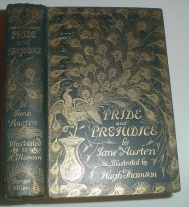![accordingtojane[1]](https://austenvariations.com/wp-content/uploads/2014/02/accordingtojane1-194x300.jpg) I can’t remember now who it was that first asked the question, just that I remember being surprised by it. I was at an author event — a book club, where According to Jane was the novel being discussed — when someone there asked me why I liked Pride and Prejudice so much.
I can’t remember now who it was that first asked the question, just that I remember being surprised by it. I was at an author event — a book club, where According to Jane was the novel being discussed — when someone there asked me why I liked Pride and Prejudice so much.
At first I giggled because I thought she was joking. Because, you know, isn’t it obvious to everyone what makes that book so great? And oh, by the way, it’s “loved” not “liked”…and didn’t all the book club members there feel the same way?!
Interestingly enough, no, not everybody did. And that was okay. But the woman who was chatting with me about Jane’s beloved novel wasn’t trying to be cute or critical, she was purely curious, and I couldn’t fault her for that. So, I talked a little bit about the things that always impress me about Austen’s writing: the wittiness, her masterful use of irony, her astute observations of people/society, the timelessness and universality of her work, etc., etc. And then there was the romantic tension and the sheer brilliance of her characters and the power of true love to effect personal transformation. But she was looking at me like I was saying “And blah, blah, Mr. Darcy’s SO awesome, blah.” I could tell my words weren’t really sinking in…
So, I tried this: I told her, “Because I’m indebted to Jane Austen for giving me a role model like Elizabeth Bennet when I was 14 and needed someone like her in my life.” The woman looked at me with a little less dubiousness. And I explained that I’d learned lessons from Lizzy — both when she was right AND when she was wrong. That she tended to see people more clearly than her kindhearted elder sister, but that she wasn’t immune to making mistakes and had to learn to own up to them. That she could be really judgmental but, sometimes (often, in my opinion), she was right on target with her assessments of others, as with Caroline Bingley and Mr. Collins and, ohhh, Lady Catherine.
And I especially loved what I learned from Lizzy about men — what Darcy actually said about her when he proposed for the second time. He stated, “You showed me how insufficient were all my pretensions to please a woman worthy of being pleased.” That it wasn’t enough for a man to merely SAY how he felt, he had to SHOW it. He had to demonstrate that his change of behavior was genuine. “…I hoped to obtain your forgiveness, to lessen your ill opinion, by letting you see that your reproofs had been attended to,” Darcy said. And, so, we couldn’t merely trust what any person (man or woman) professed to be true, but we could indeed trust what their actions proved to be true. For me, that was one of the best life lessons from any book I’d ever read.
What about you? Was there a moral or a lesson you picked up from Pride and Prejudice or from any of Jane’s novels? I’d love to hear your thoughts!!
Marilyn Brant is spending her summer eating ice cream (full disclosure: she actually does that all year long) and working on her next book (she does that through every season, too). One of her romantic comedies, Double Dipping, was just named a contemporary novel finalist in the 2012 International Digital Awards. She, her family and their guests Ben & Jerry ( ![]() ) celebrated the event together!
) celebrated the event together!
Marilyn Brant
Marilyn Brant is a USA TODAY Bestselling Author of Contemporary Women’s Fiction and Romantic Comedy. She’s published eight novels to date, including ACCORDING TO JANE, which was a #1 Kindle Bestseller, won RWA’s Golden Heart Award and was named one of Buzzle.com’s “100 Best Romance Novels of All Time.” She also wrote PRIDE, PREJUDICE AND THE PERFECT MATCH, which was a Top 100 Bestseller on both Amazon and Barnes & Noble. And her latest novel, a coming-of-age romantic mystery called THE ROAD TO YOU, is just out!


18 comments on “Morals of the Story by Marilyn Brant”